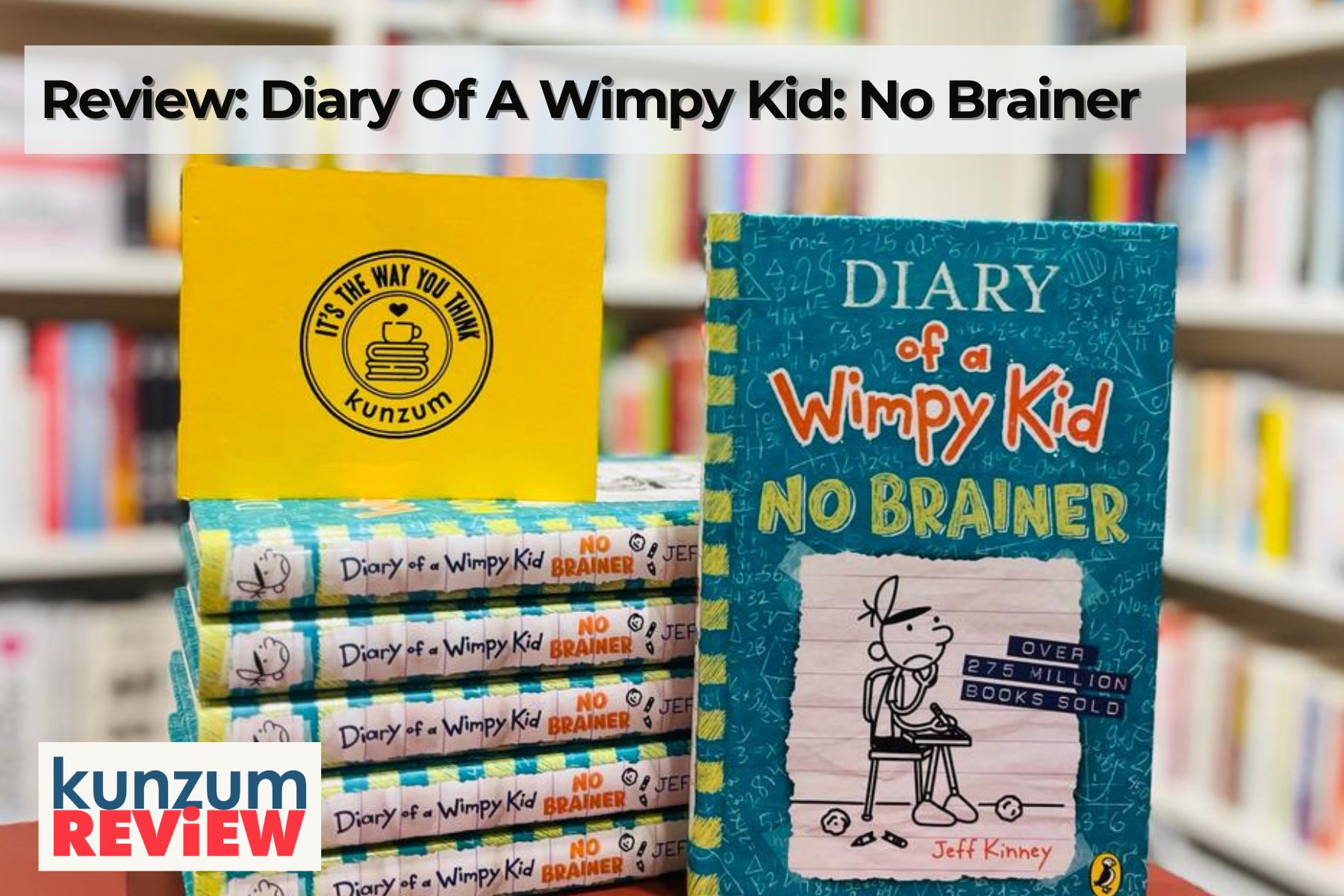
Pritha Banerjee intelligently reviews the Diary of A Wimpy Kid: No Brainer, taking a deep dive into the Wimpy Kid world and its secret appeal amongst young readers. Read all about Jeff Kinney’s 18th book and its place in the realm of young adult literature!
“Wimpy Kid” is every child’s dream confession. Why? Because young lads are told to sit in boring, consecutive, hour-long classes, compelled to wear restrictive, embarrassing and uncomfortable uniforms, often expected to work doubly hard after classes to complete their homework, and hate, absolutely detest, those spell-bees with their quizzical intonations and the over-hyped bland-tasting candy-rewards that come after. Wimpy Kid engulfs you in his story. He shows you a mirror-self, one who stands up to the bullies and participates in the tribulations of the world as a miniature adult. Is your child prepared for those punishing teachers, neglected talents, traffic in the restrooms and regimented (spoon-fed) lectures?
‘There’s no such thing as a good day in middle school. There’s just varying degrees of bad‘
Children do not have a speciesist dislike for academia. They do, however, tend to surreptitiously forgo disciplinary measures. Most kids are forced to wake up early in the morning, which itself is proven to be extremely detrimental to the registering and processing of difficult information. Imagine having a surprise test or a tooth-grinding maths problem to solve in the wee hours of the morning. Is it worth resisting the chirping birds? Or even an extra minute of peaceful sleep? Wimpy Kid confidently says no, and there are many reasons for it. He tells us that more than half of his days are spent learning the wrong lessons, for his favourite Latin teacher, Mr. Leyton, doesn’t really know any Latin at all! It was way too late into the year when this was discovered, leaving our abject protagonist to a senseless fate of learning how to order a hamburger in a language that he now knows doesn’t even exist.
Intrinsic Honesty and The Virtue of Candid Confessions
Children above the age of three often give up fiscal rewards in order to continue being the honest selves that they are. The innate morality in (young) humans, as asserted by Thomas Jefferson, is a part of their developmental conscience, posited to be as natural as their arms and legs. However, children tend to lie when it comes to individual trials– when their fault is conspicuously visible or determinable. Removed from all obstructive cultural and social constraints, free in the private realm of a personal diary, the Wimpy Kid can mention his thoughts in his diary, employing an effective verbal mode to communicate his psychological inclinations and passive judgments regarding middle school.
In “No Brainer”, the Wimpy Kid illustrates the frustration of reckoning with the infrastructural dissonances in school that often interfere with his natural abilities and points of interest. His Social Sciences teacher, Mrs. Lackey taught them only about the places that she had planned to visit with her husband after her retirement. Similarly, he needed to bring his own protective gear to the laboratory as the School lacked funds to protect children via appropriate eyewear in case of accidents.
Is It Hard to Impress the Wimpy Kid?
Kids often get sick out of nowhere. Is it stress, a relentless aberration for the misunderstood world around them or the plethora of insubstantial problems they are forced to deal with? Well, Wimpy Kid is more than that. He displays, with examples, how his teachers are not interestingly expostulating Science or Arithmetics. In Communication Theory, it is well-known that presenters often fail to incorporate the 3 Vs: 55% of Visual elements (body language, facial gestures, active engagement), 38% of Vocal Modulations, and 7% of Verbal Content. Wimpy Kid, in his pre-adolescent frankness, explains how teachers often confuse the impact of each component. Ms Pritchard, although appointed as a Geometry Teacher, uses a smartboard to pick out a breed of puppy for her new home. On the other hand, Mr Rask intends to do his best, only to fail to incorporate his students’ attention to learning complex chemical bonds.
Why Do We Love Jeff Kinney?
In an interview with The Saturday Evening Post, Jeff Kinney talks about his elation in finding the right voice for children and his journey (spanning nearly 20 years) with Wimpy Kid. He tells young adults and readers alike to keep finding themselves in stories of compassion, comprehension and love, and to be inspired to become that aspirational or heroic self as they ‘grow up’. Striving for quality humour, he has created a spacious disposition for kids around the world and only promises to do better: “I wanted to be a cartoonist, and I got to be one, and now I don’t want to stop.”
Pick up “The Diary of a Wimpy Kid: No Brainer” from any Kunzum store or WhatsApp +91.8800200280 to order. Buy the book(s) and the coffee’s on us.

About the Author
Pritha Banerjee has completed her Masters in English Language & Literature from the University of Delhi. She was the recipient of the National Essay-writing Award from the SREI Foundation in 2014. Currently acting as a writer and translator for the Sankrityayan-Kosambi Study Circle, her latest publications include articles in ‘South Asian Women’s Narratives: Literatures of Their Own’ by Cambridge Scholars Publishing, FIPRESCI India, Muse India, Pashyantee: A Bilingual Journal, and Anustup Prakashani. Her upcoming translation of Rahul Sankrityayan’s ‘Dimaagi Gulaami’ is to be published by LeftWord Books. Find her on Instagram, Twitter and Facebook!
